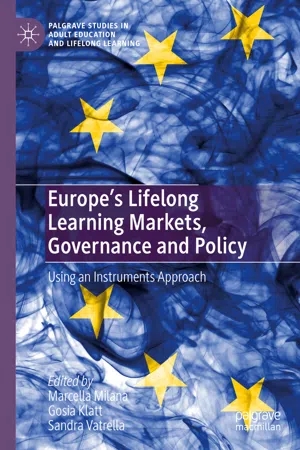1.1 Introduction
The search for effective solutions to the growing societal challenges in Europe has increasingly deepened the need for stronger political, social and economic cooperation in the European Union (EU). So, in the area of education (including adult education), multiple and complex policies have been designed and enacted at the EU and national levels. The governance of such complex education policies requires a strong policy coordination approach, as it increasingly depends on “formal and informal types of public interactions” (Pierre & Peters, 2000, p. 3), “where no single actor can claim absolute dominance” (Burns, Köster, & Fuster, 2016, p. 18). Such an understanding of governance as a process that builds on interactions lies at the heart of European governance in education. Accordingly, it requires effective coordination to ensure consistency in policy implementation and practice within the Union by a variety of actors, with own interests and histories. But effective coordination is increasingly challenging in the context of the EU (Jordan & Schout, 2006; Peters, 2012; among others), so researching European governance, including policy coordination in education, is a complex matter.
This difficulty derives first and foremost from the EU’s specific actorness . First, its multi-level nature involves increased interdependence of governments representing different territorial levels, as well as interdependence between governments and non-governmental actors (Bache & Flinders, 2004; Hooghe & Marks, 2001; Zito, 2015). Moreover, EU governance tends by its very nature towards Europeanisation. An all-encompassing, vertical and horizontal, process (Börzel & Risse, 2000; Radaelli, 2004; Schimmelfennig, 2010), Europeanisation largely implies the transformative effect of the EU governance system on the political institutions, policies and political processes of the member states, and beyond European countries (Sabel & Zeitlin, 2010). Herefrom a growing interest can be observed from the literature in researching European politics and Europeanisation to scrutinise specific mechanisms or instruments such as the Open Method of Coordination (OMC) or to understand the changing nature of EU governance, and evaluate the struggle between its legitimacy and effectiveness (Chatzopoulou, 2015; Tholoniat, 2010; Walters & Haahr, 2005). In fact, Europeanisation points not only at the process of creating a European policy space (Lawn & Grek, 2012) but most importantly to an all-encompassing process of “domestic adaptation to European regional integration” (Graziano & Vink, 2008, p. 7), which occurs through regulatory politics and a “joint decision mode” (Kohler-Koch & Rittberger, 2006). Accordingly, soft governance, particularly the OMC, and policy “instrumentation” more broadly (Hood & Margetts, 2007; Lascoumes & Le Galès, 2007) have attracted a growing interest among scholars to analyse decision-making within the EU and its member states and its impact on Europeanisation. So a plethora of studies exist on European governance that have put under close scrutiny specific mechanisms or instruments (the OMC in primis) to comprehend the changing nature of EU governance, and its effects on, for instance, national Higher Education systems across Europe (cf. Brøgger, 2019; Chatzopoulou, 2015; Ravinet, 2008; Tholoniat, 2010; Walters & Haahr, 2005).
All of this furthers our understanding of European governance and its effects on education practice, but often these studies concentrate on the analysis of single policy instruments. By contrast our main concern is in the policy instrumentation process that substantiates the governing of adult education through EU coordination. Our main focus is specifically on governance mechanisms and policy instruments as key for the act of coordinating action (Dill, 2000; Dill & Beerkens, 2010; Erkkilä, 2016; Jordan, Wurzel, & Zito, 2005; Kassim & Le Galès, 2010).
As a matter of fact, interest in the policy mechanisms and instruments or tools has been popular among academics from public policy, public administration and political science as means for understanding government’s actions, policy processes and their effects.
In public administration, Salamon (2000, p. 1612) notes that the “massive proliferation” in “the tools of public action, in the instruments or means used to address public problems” has fundamentally transformed policy-making. The growth in the variety of actors involved (private, international, non-for-profit organisations) has changed the way of policy-making as well as its very outcomes. Private, international and non-for-profit organisations utilise policy instruments in different ways that result in the establishment of programmes, which are substantially different from those arising from direct government action (Salamon & Elliott, 2002).
Yet, depending on the research interests pursued, various approaches have developed over time to studying the contours of the massive proliferation addressed by Salamon (2000) and still co-exist. We identified different research strains in the specialised literature that adopt an instruments approach and restricted our attention on those aimed at (1) evaluating the effects of policy instruments, (2) appreciating the choice of policy instruments and (3) unpacking the process through which policy instrumentation occurs. Although not comprehensive or causal, in the following sections, we discuss each of these strains with the objective to pinpoint at the main definitions, standpoints, benefits and uses of the instruments approach as an analytical devise across disciplines.
1.2 Evaluating the Effects of Policy Instruments
One of the strains identified in the literature on policy instruments focuses on evaluating their effects. Such an interest comes mainly from public administration researchers, whose contribution to the understanding of policy instruments has been substantial. Northern American scholars, for instance, have been interested in instruments as the “means used to address public policy problems ” (Salamon & Elliott, 2002, p. 2). Accordingly, Peters and Van Nispen (1998) argue that the popularity of instruments in policy studies derives from their interest in solving practical problems, by linking policy intentions with operational activities of government departments. Indeed, public administration asks questions about how public policy problems may be addressed and what knowledge and skills are needed (Salamon, 2000), hence, its on-going attention on the conversion of policy intentions into administrative actions through various instruments or tools, for the most used as synonymous terms.
Traditionally policy instruments have been conceptualised as the “objects” that link activities and actions (de Bruijn & Heuvelhof, 1998) and have been classified in regulatory, financial or communicativ...
